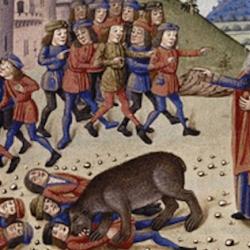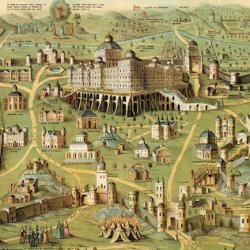INTRODUCTION
The Omride dynasty ends in a bloodbath, and will shortly see the Baal temple in Samaria destroyed. This is a warning for the house of David: Omri’s house began with a David-like hero, and ended disastrously. David’s house too will end in blood and Jerusalem’s temple will be destroyed.
THE TEXT
“And Elisha the prophet called one of the sons of the prophets, and said to him, ‘Get yourself ready, take this flask of oil in your hand, and go to Ramoth Gilead. Now when you arrive at that place, look there for Jehu the son of Jehoshaphat, the son of Nimshi, and go in and make him rise up from among his associates, and take him to an inner room. 3Then take the flask of oil, and pour it on his head, and say, “Thus says the LORD: “I have anointed you king over Israel.” Then open the door and flee, and do not delay.’ So the young man, the servant of the prophet, went to Ramoth Gilead . . . .” (2 Kings 9:1-37).
CONTEXT AND STRUCTURE
This chapter brings to complete fulfillment a prophecy first made in 1 Kings 19, where Yahweh instructed Elijah to anoint three horseman of the Omride apocalypse: Elisha, Hazael, and Jehu. Elisha’s ministry has been largely concerned with carving out a zone of life and prosperity within the death land of Israel, but this is itself a judgment against the house of Ahab, since it means that Yahweh’s attention turns toward a remnant rather than to the whole people of Israel. “Jehu” means “He is Yah,” and he is the son of Jehoshaphat, “Yah judges.”
This episode also continues the contrast of inside/outside (Elisha heals behind closed doors, remains in a room while others come for help, knows what the king of Aram says in his bedroom, etc.). Jehu is anointed behind closed doors (vv. 6-10). But what is whispered in secret is eventually proclaimed in the open. This also links to the doorway theme, a theme of rebirth and renewal that we’ve seen in the Shunammite story and the story of Naaman. The coming of Jehu is the coming of Yahweh’s judgment, which means Yahweh’s renewal. Jehu’s coming is an “advent,” foreshadowing Jesus’ arrival in Jerusalem, His challenge to the Ahab-like Herod, His condemnation of the temple of Jerusalem, no better than a house of Baal.
This section begins with the reign of Ahaziah, and is structured as a chiasm:
1. Reign of Ahaziah, 8:25-29
2. Elisha’s instructions and the fulfillment (anointing; flight), 9:1-10
3. Jehu proclaimed king, 9:11-14a (peace; madness)
4. Joram and Ahaziah in Jezreel, 9:14b-16
3. Jehu comes to Jezreel, 9:17-26 (peace, madness)
2. Death of Ahaziah, 9:27-28 (flight)
1. End of Ahaziah’s reign, 9:29
JEHU IS KING
Jehu is “guarding” Ramoth-gilead from the Arameans (vv. 1, 14; cf. 1 Kings 22). Apparently, Ramoth is again in Israel’s hands. Just as Ahab died during a battle at Ramoth, so the plot against his sons will be carried out when Jehu is anointed at Ramoth. The young prophet’s flight (v. 3) enacts the later flight of Jehoram and Ahaziah before the determined Jehu (vv. 23, 27). What prophets say sculpts history; what prophets enact also drives history forward.
Jehu is the only king in the history of the North to be anointed (v. 6), the only “Messiah” among the kings of Israel. This highlights the typological dimensions of Jehu’s reign, and also shows that deliverance from the Omrides is a kind of salvation for the remnant and for all Israel. Jehu’s anointing also connects him with the kings of the Davidic line who destroy idols, but also, more ominously, to Saul (the word “flask” in v. 3 is used elsewhere only at 1 Samuel 10:1). In Kings, only three kings are anointed: Solomon the temple-builder, Joash of Judah the first great temple-reformers, and Jehu the temple-destroyer. They all foreshadow the coming Anointed One who, like Jehu, will avenge the blood of the prophets (v. 7; cf. Matthew 23:29-36).
Perhaps expecting that the prophet has brought some prediction about the battle, Jehu’s men ask “Is it peace?” This question becomes a leitmotif through the chapter, and it’s clear that Jehu comes not with peace but with a sword. By anointing Jehu, the prophet seems to have communicated his “madness” (v. 11) to Jehu (v. 20), a Spirit-induced battle frenzy.
AVENGER OF BLOOD
Elisha plays the role of kinsman-redeemer by delivering from death and debt, but Jehu plays kinsman redeemer by avenging the blood of Yahweh’s kin, the prophets. King Joram has left the battlefield to nurse a wound in Jezreel; Ahaziah, Joram’s brother-in-law, has come up from Judah for a visit; and Jezebel is in Jezreel as well. Yahweh has gathered all the major players in Ahab’s house in one location, where Jehu can score a trifecta.
Like father, like son: Sons who live like Ahab die like Ahab. Joram is killed with an arrow (v. 24), and Ahaziah is sounded, and then dies in Megiddo (v. 27; cf 1 Kings 22:34-35). These deaths, appropriately, take place at the vineyard of Naboth, so that the blood of vengeance is shed in the same place as Naboth’s innocent blood. Somehow, Jehu is aware of Elijah’s prophecy, and sees himself as the fulfillment (v. 26). Jehu’s slaughter looks like simple slaughter, but it is a cleansing sacrifice. Like a priest, he “fills his hand” (v. 24) to carry out the sacrifice (cf. 2 Samuel 21). (“Fill the hand” is the Hebrew term translated as “ordain” in Exodus 29 and Leviticus 8-9). This section closes with a reference to the beginning of Ahaziah’s reign. It seems misplaced, but this is a bit of black humor, since the narrator tells the story of his death before getting around to telling us that he became king. He was so doomed. Jehoram has no death notice at all. Last we hear of him, his corpse is being tossed unceremoniously onto the field of Naboth for the dogs.
GREAT WHORE
Jehu accuses Jezebel of witchcraft and whoredom (v. 22). She is both the instigator and the symbol of Israel’s idolatrous harlotries. When Jehu arrives, she decides (playfully, perhaps) to play the part, painting her eyes and adorning her head as if to welcome a John (v. 30). She calls Jehu a “Zimri,” since Zimri was also a general who overthrew a king but lasted only a week (1 Kings 16:8-21).
Jehu finds some allies among Jezebel’s attendants, who throw her down. She is a feast for birds and beasts, like the harlot of Revelation (cf. Revelation 19:19-21). She is reduced to refuse (v. 37). But her blood “sprinkles” the wall, another indication that Jehu’s vengeance against the house of Ahab is redemptive (“sprinkle” is normally used for sprinkling blood on the altar). Having offered his “peace” sacrifice, Jehu goes in to eat and drink, celebrating the supper of the Lamb now that the harlot is destroyed.














